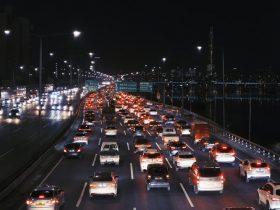By Kenneth Chan
While discussions on the impact of the introduction of ridesharing in Metro Vancouver have largely revolved around how taxis and public transit will fair, one other mobility service that could see a dent to its use is car share.
Specifically, point-to-point, free-floating services operated by Car2Go/Share Now and Evo Car Share — the dominant form of carsharing in the region, with vehicles picked up and left anywhere within the company’s operating area — are expected to be impacted most.
With greater freedom of use for this type of carshare, there is a significant overlap with the type of mobility provided by rideshare services.
A 2018 report by Vancity on the impact of carshare in Vancouver deems the city to be “North America’s carsharing capital.”
According to the report, in late 2017, there were approximately 3,000 carshare vehicles in the region — more than the 2,080 vehicles in Montreal, 1,900 vehicles in Seattle, 1,650 vehicles in Toronto, 1,500 vehicles in San Francisco, and 1,060 vehicles in Portland. All of these cities have rideshare services, dominated by Uber and Lyft.
On a vehicle-per-capita basis, Vancouver also beats carshare stronghold cities of Milan and Berlin; Vancouver has 4.22 carshare vehicles per 1,000 people.
“Other suggested factors behind Metro Vancouver’s car- sharing success include a limited supply of taxis, an absence of ridesharing services such as Uber and Lyft, short supplies of affordable housing and parking, more environmentally conscious residents, a young urban population more likely to prioritize big city living over car ownership, and a large immigrant population (many unaccustomed to North America’s car culture),” states the report.
A Fall 2017 survey of frequent carshare users found that 53% of those between the ages of 19 and 30 are using carshare due to the absence of Uber and Lyft, and 18% for the older age range of 51 to 60. Across respondents in both Vancouver and the wider Metro Vancouver region, latent, unmet demand for ridesharing was 43%.
The latest data, as of Spring 2019, shows there are now over 3,500 carshare vehicles in the region, with free-floating carshare services — mainly Car2Go and Evo — accounting for 80% of the entire carshare fleet in Vancouver.
Kendell Kelton with Share Now, the parent company of Car2Go, confirmed for Daily Hive that Vancouver is Car2Go’s largest market in North America. As of August 2019, they have about 223,000 members in Metro Vancouver sharing 1,200 vehicles.
Marc-David Seidel, a professor at the UBC Sauder School of Business, says the free-floating carshare companies likely saw “an initial bump” when they first launched in the region as a result of the absence of rideshare.
At the same time, he believes the entrenched nature of carshare use in Vancouver will allow companies to better overcome a new type of competition to the local market.
“Carsharing companies now have an established base of people used to using them, so the entry now of rideshare is probably not going to have as much of a negative impact on them as it would have prior to them being created,” Seidel told Daily Hive in an interview.
“They have a critical mass in essence, and people have established patterns and are used to the idea. There are certain times when that will be more convenient for certain models and less expensive than ridehailing.”
Taxis would see the greatest impact from rideshare, followed by free-floating carshare services. He does not anticipate any negative impact to fixed-point, two-way station rideshare services like Modo and Zipcar, which require users to pick up and return a vehicle at a designated station.
Another factor that could determine how free-floating carshare services will be able to compete is the cost of using rideshare. While the Passenger Transportation Board (PTB) has determined that the minimum base fare for rideshare will be the taxi flag rate, there is still some ambiguity over the distance-travelled per kilometre cost beyond the base fare.
“Depending on how low that price goes, it could have more of an impact on the carshare market,” added Seidel.
As well, the operating areas of Car2Go and Evo are relatively limited.
Car2Go’s free-floating home area covers most of the cities of Vancouver and North Vancouver, plus satellite parking hubs at UBC, Vancouver International Airport, and BCIT.
With Evo, its home areas are limited to the cities of Vancouver, North Vancouver, and New Westminster, and designated areas at UBC, SFU Burnaby Mountain, Capilano University, BCIT, and Vancouver International Airport.
Car2Go and Evo users must start and end their trip within the home area or a satellite/designated parking hub. These locations — high-density areas, and where there is generally less car ownership — are strategic for the companies for both demand and maintenance reasons.
While the PTB has granted rideshare companies with the ability to operate within an expansive boundary that encompasses all of Metro Vancouver, the Fraser Valley, Squamish, and Whistler, nothing restricts companies like Uber and Lyft from only selecting key operating areas within the region to focus on, especially in the face of the possible difficulty in finding enough drivers with a Class 4 commercial license.
Both Uber and Lyft announced their intentions this month to launch services in Metro Vancouver before the end of the year, but the yet-to-be-determined availability of their services would likely be a factor for free-floating carshare’s ability to compete.
More recently, soaring gas prices have also driven more people in the region towards carshare services, with fuel, parking, and insurance all included.
In May 2018, during the region’s record-setting gas prices, Car2Go reported that its use was up by 23% year-over-year, and there had been a 10% increase in its number of local members. The company also saw historic highs in the utilization of its fleet, topping at over 13% per week.
At the moment, both free-floating carshare giants operating in Metro Vancouver say they are unfazed by the new competition brought by the introduction of rideshare, and welcome the improved mobility services like Uber and Lyft will enable.
“Share Now continues to support a multimodal lifestyle. The rapid growth and popularity of the mobility sector means that, more than ever before, people are embracing shared transportation options as a way to move around the cities in which they live, work and/or play,” said Kelton.
“Ultimately, this means that the need for personal vehicle ownership is declining, and that itself is a very good thing and something we support.”
Tai Silvey, vice-president of Evo, had a similar take on the arrival of rideshare: “Evo is all for more mobility choices for British Columbians. Our research shows that Evo members use a variety of ways to get around — car share, transit, biking, taxi. Ridehailing will just add one more option. Each transportation mode has its purpose… We believe there’s room for everyone.”
She says free-floating carshare services like Evo enable convenient trips with multiple stops and the transport of large cargo such as bikes and skis, as well as longer trips.
To a certain extent, carsharing also has a symbiotic relationship with public transit; Vancity’s study determined “a correlation between good public transit systems and carsharing.”
“Transit options and availability must be present for car-sharing to be a realistic alternative to private vehicle ownership; people cannot — or will not — carshare for every trip they choose to make. Vancouver has a reasonable, and expanding, transit system that works well in combination with car-sharing,” reads the study.
The City of Vancouver has also been encouraging carsharing as an effective measure to reduce private vehicle use, making moves that further entrench carshare services into the mobility fabric of the city.
In July, it relaxed a number of parking rules for carshare vehicles, allowing carshare vehicles to end their trips in metered curbside parking spaces, for instance, to improve their accessibility and usability in retail areas. Other changes include new incentives that encourage carshare companies to transition to zero-emission vehicle models over the coming years.
As well, the city has been working with developers to have them build carsharing spaces into their new building projects. In exchange, the city reduces the number of costly parking stalls required for a development.
According to the city’s research, free-floating carshare services can reduce transportation-related greenhouse gas emissions by up to 15%, while fixed-point carshare reductions reach a ceiling reduction of 54%

Rideshare could put a dent in Vancouver's high level of carshare usage
Posted by
Jimmy_Lecar
5 years Ago
13th December 2019
Shares
What’s your reaction?
Shares
Jimmy_Lecar

















